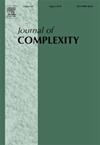On the expected number of real roots of polynomials and exponential sums
IF 1.8
2区 数学
Q1 MATHEMATICS
引用次数: 3
Abstract
The expected number of real projective roots of orthogonally invariant random homogeneous real polynomial systems is known to be equal to the square root of the Bézout number. A similar result is known for random multi-homogeneous systems, invariant through a product of orthogonal groups. In this note, those results are generalized to certain families of sparse polynomial systems, with no orthogonal invariance assumed.
关于多项式和指数和的实根的期望个数
已知正交不变随机齐次实数多项式系统的实数投影根的期望值等于bsamzout数的平方根。一个类似的结果是已知的随机多齐次系统,通过正交群的乘积不变。在这篇笔记中,这些结果被推广到某些稀疏多项式系统族,不假设正交不变性。
本文章由计算机程序翻译,如有差异,请以英文原文为准。
求助全文
约1分钟内获得全文
求助全文
来源期刊

Journal of Complexity
工程技术-计算机:理论方法
CiteScore
3.10
自引率
17.60%
发文量
57
审稿时长
>12 weeks
期刊介绍:
The multidisciplinary Journal of Complexity publishes original research papers that contain substantial mathematical results on complexity as broadly conceived. Outstanding review papers will also be published. In the area of computational complexity, the focus is on complexity over the reals, with the emphasis on lower bounds and optimal algorithms. The Journal of Complexity also publishes articles that provide major new algorithms or make important progress on upper bounds. Other models of computation, such as the Turing machine model, are also of interest. Computational complexity results in a wide variety of areas are solicited.
Areas Include:
• Approximation theory
• Biomedical computing
• Compressed computing and sensing
• Computational finance
• Computational number theory
• Computational stochastics
• Control theory
• Cryptography
• Design of experiments
• Differential equations
• Discrete problems
• Distributed and parallel computation
• High and infinite-dimensional problems
• Information-based complexity
• Inverse and ill-posed problems
• Machine learning
• Markov chain Monte Carlo
• Monte Carlo and quasi-Monte Carlo
• Multivariate integration and approximation
• Noisy data
• Nonlinear and algebraic equations
• Numerical analysis
• Operator equations
• Optimization
• Quantum computing
• Scientific computation
• Tractability of multivariate problems
• Vision and image understanding.
 求助内容:
求助内容: 应助结果提醒方式:
应助结果提醒方式:


